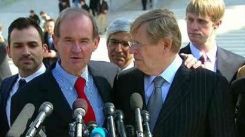BY NATASHA BARSOTTI — Gay marriage supporters and opponents thronged the precincts of the US Supreme Court, which began hearing arguments today (March 26) on whether California’s Proposition 8 should stand. ![]()
A critical issue for the justices is whether the case should be before them at all. If the justices dismiss the case, it would reportedly make same-sex marriages legal in California once more.
New York Times correspondent Scott Shane noted that lawyer Charles Cooper, who argued for opponents of same-sex marriage, didn’t launch an “all-out attack on gay marriage as such” but pointed out that there was an ongoing democratic debate and it would be wrong for the court to “step in and preempt that process.”
Shane says what was surprising was the degree to which Cooper avoided a “direct attack” on gays and lesbians and instead urged the court to let the political process run its course.
In his turn, Ted Olson, arguing for gay-marriage supporters, said that to exclude gays from an institution — that both sides of the issue agreed is an “extremely important” one in society — was wrong constitutionally. Speaking with the press after the day’s proceedings, Olson said he had no idea how the justices would rule.

“We are confident where the American people are going with this. We don’t know for sure what the US Supreme Court is going to do, but we are very, very gratified that they listened, that they heard, they asked hard questions,” he said.
According to Shane, Justice Anthony Kennedy, who is considered to be a swing vote between the liberal and conservative wings of the court, made the point “with some force” that there are 40,000 children of same-sex couples in California alone and that those children want full recognition of their parents’ unions.
But Kennedy also contextualized the experience of marriage, saying the issue posed a handful of states with a few years’ experience with gay marriage “against more than 2,000 years of experience with traditional marriage.”
A Reuters report quoted Justice Samuel Alito as saying that gay marriage, as a concept, is “newer than cellphones and the Internet.”
It also noted that Justice Antonin Scalia, a conservative voice, said there is “considerable disagreement” about whether gays and lesbians should be able to raise children.
More liberal justices questioned Cooper about his contention that “the government’s interest in promoting procreation is a primary reason for limiting the definition of marriage.”
Justices Elena Kagan and Stephen Breyer wanted to know how Cooper’s argument holds up when infertile opposite-sex couples can marry.
Shane notes that the atmosphere outside the court was not angry but “joyous,” particularly among those in favour of gay marriage, while at the periphery and scattered in and among the crowd were others who opposed it, with some shouts of “one man, one woman.”
“No hate, we just disagree!” one marcher, holding a sign that proclaimed that children do best with a mother and father, yelled, according to Reuters. “It’s a family; that’s all,” observed New York city educator Jay Golon, who is in favour of gay marriage.
There didn’t appear to be any significant confrontations during the day.
The court reconvenes on Wednesday, March 27, to consider the Defense of Marriage Act (DOMA).
Here’s a transcript of today’s proceedings.

 Why you can trust Xtra
Why you can trust Xtra


